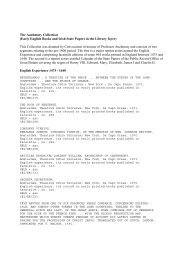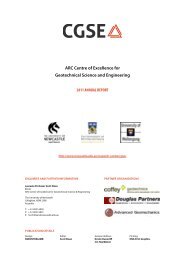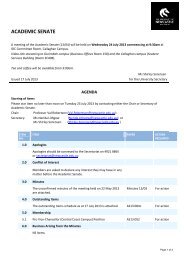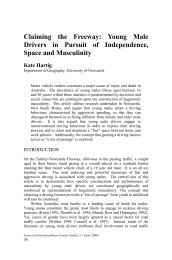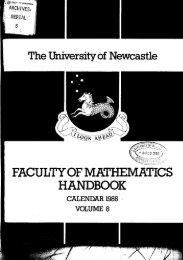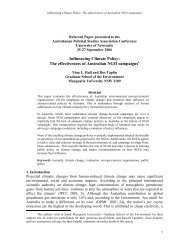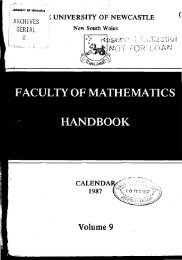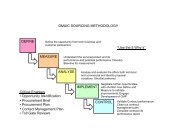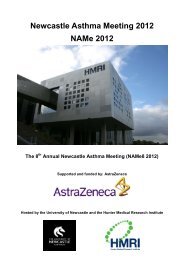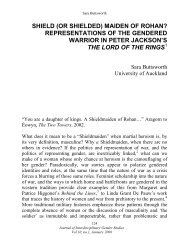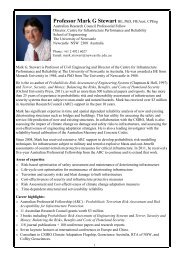AN AUSTRALIAN LAXGUAGE. WINTA 4.-PART 4. Section 9. Tulo a, ' straight,' opposed to crooked'; 'upright' as to sharacter ; 'truth' as to expression, opposed to falsehood ; tuloa kan ta, ' one who is straight, upright, true.' Moron, 'life,' opposed to death ; animal, not vegetable, life. Kakilli-kan ta, 'it is one who remains, who IS, who exists'; kakilli from kakilliko, 'to be' in some state. Kaumal, 'great'; piriwal kauwil, 'lord or king.' lit.. 'great chief ' ; kauwal- kauw 81, ' great-great,' ' very great.' Tanti katai kakilliko, 'thus to be always,' 'to be for ever.' Pulul-pulul, ' trembling, shaking.' Kan~n, ' will be.' Bukka, ' wrath, rage, fury '; bukka tin, 'on account <strong>of</strong> wrath'. gikoumba tin 'on account <strong>of</strong> his.' Kovra, ' a floe6 herd, an assembly, a mob, a nation'; y antin b ar a lr onara, ' all they, the assemblies <strong>of</strong>. nations.' Niuwarin, thecausativecase <strong>of</strong> niuwara, 'anger'; niuwarin, 'because <strong>of</strong> anger'; 'from or on account <strong>of</strong> anger,' as a cause. Section 10. Bapai,,' nigh at hand, close to '; bapai ta ba, ' it is nigh to.' --. Section 11. Wiy an, the present tense <strong>of</strong> wiyellilio, ' to communicate by sound, to speak, tell, say, call out '; yantinko wiyan bon ba, ' all when they call on him.' The verbalizing particle, ba, is equivalent to ' when,' or ' at the time when ' the verbal act or state shall be or mas, according to the tense <strong>of</strong> the verb. Ralog, 'afar <strong>of</strong>f, distant.' Eakillin, ' continues to be,' 'is now being'; the present participle <strong>of</strong> the verb knlcilliko, 'to be ' in some state. Bar un kai, ' from, on account <strong>of</strong> them,' sc., persons. Tarakai tin, ' from, on account <strong>of</strong> the evil,' sc., thing. Section 12. Wirrilli ; hence wirrilli ko, ' to wind up as a ball <strong>of</strong> string.' The blacks do this to their long fishing-lines, and opossum-fur cords, to take care <strong>of</strong> them, to preserve them ; hence the verb means ' to take care <strong>of</strong>, to preserve, to keep together, to guide,' as a flock <strong>of</strong> sheep ; mirrilli-kan, ' one who takes care <strong>of</strong>' by some act <strong>of</strong> locomotion, as a watchman going his round. Mirral, 'desert, desolate, miserable'; 'a state <strong>of</strong> want '; mirral ta unni, 'this is a desert place'; mirril-lag unni, ' this irr desolate or miserable,' because in a desert there is nothing to eat or drink; mirral kitan, 'is now at present in a miserable or desolate state, in a state <strong>of</strong> want '; keawgi, 'not to be.' Keawai mal, ' certainly shall not be '; equivalent therefore to ' shall not' ; mirral kanun, 'shall be in want.' . SELECTIONS FBOM THE SCRIPTURES. 2 13 Section 13. Gurrara-kan, ' one who personally attends to '; gurrjrakarl liauail, ' one who is very pitiful.' Gurrira-mulli-kan, 'one who causes or exercises attention,' 'one who does attend to'; the phrase means ' he is a merciful MINTA 5.-PART 5. Section 1. Goro, 'three'; see page 108. Kabilli, 'state <strong>of</strong> being'; hence kakilliko, ' to be, to exist' in some state ; we cannot express 'is dead ' by tet t i ka tan, because ka t an implies existence, though we may say nloron katan, 'is alive,' because existence is implied; 'is dead ' must be te t ti ka ba, which means ' is in the state <strong>of</strong> the dead '; generally the blacks say kulmon, 'stiff, rigid' for ' deacl': thus t et ti k a b a k u lw o n is equivalent to 'dead and stiff ,' in opposition to 'a swoon,' which might be the meaning, unless circumsta,nces led to another conclusion. Wokka, an adverb, ' up,' opposed to bara, ' down '; wokka TZiFaam.oro k o ka b a, ' sre up in heaven.' ne who speaks it is' ; this is the Grn pplied to a person; to a thing, it would it is,' in opposition to corporeal substance; ' the bsddy,' and mamuya is ' a ghost " word for ' the body.' ot to be regarded but cs ' one TV~O acts sacredly,' ge <strong>of</strong> being held sacred or ds, a pig devoted to the god Oro, in former times, mas made sacred by having a red feather thrust through and fastened to its ear, and thus the reverend pig was privileged to feed anywhere unmolested, as being sacred ; nor was he confined to a tithe <strong>of</strong> the produce if he broke through into any plantation, but xras permitted to eat his fill, not, however, without a murmur at the sacred intru- object; gali, 'this,' as agent; unni e threeit is'; makil bo ta, 'oneitis,
114 AX AUSTRALIAYY LANBUAQE. Section ,2. Yuka. 'sent'; hence yuknlliko, 'to send' a person; but to Section 4. send property is tiyumbilliko. Yinal, 'son.' Kakilliko, ' for-to be'; here the infinitive form, as usual, denote the purpose. Miromulli-kan means 'one who keeps or takes care <strong>of</strong> '; from miromulliko, 'to keep with care'; mironlullikan noa kakilliko means ' he is for-to-be one who keeps with care,' hence a 'Saviour.' From the same root, ~irom2 also is a ' Saviour.' 'A deliverer' wouId be mankilli- kan, 'one who takes hold <strong>of</strong>' ; but then the evil must be expressed out <strong>of</strong> which the person is taken or to be taken. Tantin purrai ko, 'for all lands'; 'for all the earth'; 'for the whole world.' - Section 3. Niuwoa- bo, 'himself it is who is,' empha,tic. Sectiovz 6. Eloi-to noa, 'God he,' asapersonal agent; pita1 ma kaumQ1, ' causes great joy,' sc., towards. Tantin ki!ri, 'all men.' Gukulla ta noa, 'it is he gave'; from gukilliko, 'to give' the ta., 'it is,' affirms the act. Wakal b o ta, ' only one '; lit., 'one-self only.' Gali ko, 'for this purpose'; gali, the emphatic pronoun, '@.$ gala, '&hat'; galoa, 'the other'; the demonstrative pronoun are unni, 'this'; unnoa, 'th~t'; untoa, 'the other.' Y antin-to ba, 'that all who' ; the particle, to, denotes agenc and b a verbalizes. Gurran, 'believe,'the present tense <strong>of</strong> gurrilliko,'to to believe.' Gi k o u g kin, 'on account <strong>of</strong> him,' as a cause; for, if he s you hear; he is therefore the cause <strong>of</strong> your hearing, and if assent to that which he says, you continue to hear; if do not hearken to him, or else you ody pretend to h the verbal objective pronoun 'him' is bon; gurran the present tense, 'hear him,' but has no reference to the <strong>of</strong> that hearing, whereas the use <strong>of</strong> the other pronoun gi kin implies that they hear him so as to attend to what h and believe. Keamai wal bara tetti kin~n, 'they certainly shallnot b in a state <strong>of</strong> death.' Kulla 1, 'but certainly' sbail, or 'because cert%inl shall. Panti Iratai, 'in this manner always.' Bar u nb a, ' belonzing to them,' 'theirs.' Kakillinuu, 'mill be and continue to be'; from kakilliko,'t be, to exist' in some state. Moron, 'life'; kakillinLin moron means 'a future, state o being, and continuing to be, alive.' -kan, ' one who speaks '; 'an advocate.' ai to a b a k a t an, ' it remains with the Father.' WINTA G.--PAZT 6. Sectiolz 10. Section 12. f
- Page 1 and 2:
AN AUSTRALIAN LANGUAGE AS SPOKEN BY
- Page 3 and 4:
- INTRODUCTION CONTENTS. . .. . . .
- Page 5 and 6:
X THE ILLUSTRATIONS. The New Englan
- Page 7 and 8:
H~V IRTEODUCTION. WTBODUCTIOR. xv i
- Page 9 and 10:
sriii IHTPODOCTIOX. It mar possibly
- Page 11 and 12:
xsii IBTBODUCTION. carried to Austr
- Page 13 and 14:
xxvi IPI-TBODUCTION. ha~e noticed i
- Page 15 and 16:
XSX IXTEODUCTION. ' tvo ' or ' seco
- Page 17 and 18:
I have no cloubt that this is the s
- Page 19 and 20:
and the Awabakal has a 'conjoined d
- Page 21 and 22:
degree of error, ~vhicll aEects als
- Page 23 and 24:
dPi INTBODCCTION. the numeral ' ten
- Page 26 and 27:
Xi 161RODUCTIO7S. use, the Latin su
- Page 28 and 29:
lri IHTI~ODCCTION. which they are j
- Page 30 and 31:
11 ISTBODGCTIOS. the Kelts, a ~ ery
- Page 32 and 33:
' fire.' They hare no circuiucision
- Page 34 and 35:
CVJIPREHESDIR'U THE PItISCIPLES AS1
- Page 36 and 37:
Jlaring resicled for manr years in
- Page 38 and 39:
Cudgel, Gammon, Gibber, Gummy, Goon
- Page 40 and 41:
The essential vorrels are 2, z", 22
- Page 42 and 43:
8 AN AUSTRALIAN L~GVAOE. THE GBIJIJ
- Page 44 and 45:
12 AN AVSTEALIAX LASGCAGE. to the a
- Page 46 and 47: 'n.1-VZ sa-ux ua-pRN soponog { "JON
- Page 48 and 49: RECIPROCAL Pnoao~xs. Gatoa-bo, 'Iln
- Page 51 and 52: OF THE PARTICIPLES. 1. The Pr~senf.
- Page 53 and 54: 30 AN AUSTBILIAW LBSGUAGE. PERAIISS
- Page 55 and 56: Declension of this Verb, 11-11en it
- Page 57 and 58: PARTICIPLES. T. 1. Tiir-bur-rill-iu
- Page 59 and 60: SUBJ'OXCTTTE 3100~. T. 10. Tetti bu
- Page 61 and 62: PREPOSITIONS. Ba, 'of [--deiloting
- Page 63 and 64: %[he+- a curve in its orbit from an
- Page 65 and 66: Kirrin, nz., paill. 11. Kdgka, nz.,
- Page 67 and 68: Bfinmulliko, nz., to rob, to take G
- Page 69 and 70: 62 AN AUSTEALIA~Y LANGUAGE. Tetti-b
- Page 71 and 72: GG LY AUSTRALIAN LL~YQUAGE. ILLUSTB
- Page 73 and 74: 70 AS AVSTX~LIIN LASGCIGE. ILLGST~A
- Page 75 and 76: B 6 m mil n b i a b i - t i a ; nr.
- Page 77 and 78: 78 AN AUSTRILIAX LASGUIGE. . ILLEST
- Page 79 and 80: Tunug unni Turkey-ko-ba; nt., this
- Page 81 and 82: C [THE ORIGINAL TITLE-PAGE.] 6 A KE
- Page 83 and 84: AX AUSTRALIAN LISGEAGE. As aborigin
- Page 85 and 86: AX AUSTRALIA?? LANGUAGE. THE IKEY:
- Page 87 and 88: 9 -4 AN AUSTRALIAN LANGUAGE. The af
- Page 89 and 90: 98 All ATSTBALIAN LANGUAGE. . TIlE
- Page 91 and 92: [The common root-words of the langu
- Page 93 and 94: 106 AN ATSTRALTAN LAXGUAOE. . SELEC
- Page 95: 110 AN AUSTRALIAN LANGUAGE. SELECTI
- Page 99 and 100: Xectiolz 3. Palcoai-kan bag n~oron
- Page 101 and 102: PART IT. -C THE GOSPEL BY ST. LUKE.
- Page 103 and 104: THE AUTHOR'S PREFACE. IT i3 a matte
- Page 105 and 106: THE GOSPEL BY LUGE, C. 1. 129 in mi
- Page 107 and 108: 133 AN AUSTRALIAN LANGUAGE. THE GOS
- Page 109 and 110: 136 AX AUSTRALIAN LbNGU-4GE. 15. Ga
- Page 111 and 112: 140 AX AUSTRALIAK LASGUAGE. tabirug
- Page 113 and 114: 144 -4s AUSTRALIAN LANGUAGE. THE GO
- Page 115 and 116: 14s AN 4USTRALIAN LANGGSGE. THE GOS
- Page 117 and 118: 253 AN AUSTRALIAN LANGUAGE. THE GOS
- Page 119 and 120: 156 AN AUSTRALILV LANGUAGE. THE GOS
- Page 121 and 122: 160 AN ilusTRaL1X-T LANGUAGE. THE G
- Page 123 and 124: 164 LY AUSTRALIAN LASGUAGE. THE COS
- Page 125 and 126: 19. Gatuu taraito wiyii, Guki116l11
- Page 127 and 128: 1;" AS bU3TRhLIbf LA-SC;TA(;E. TIIE
- Page 129 and 130: lifi AX ATSTEALIAS LASGCSGE. THE GO
- Page 131: 113 AX -4CSTG-4L1.$?3 LISGU~~GE. TH
- Page 134 and 135: 186 -4R AUSTR-kLIAN LAXGUAGE. THE G
- Page 136 and 137: 190 -hY AUSTRALIAX L~?~'Gus(~E. THE
- Page 138 and 139: AN AUSTRALIAN LAFGU-4GE. 35. Gat111
- Page 140 and 141: LEXICON GOSPEL r \ ~ TO ~ 8111ST ~
- Page 142 and 143: c1~l~~i.5. / [it. t!:?i.ist. ' il~~
- Page 144 and 145: 204 -45 BTSTEILXAN LA.KGUACE. Eredc
- Page 146 and 147:
aos AS ACSTRZILIAN LLTGCAGE. Galili
- Page 148 and 149:
I
- Page 150 and 151:
314 AX AUSTRALIAX LANGUAGE. THE LES
- Page 152 and 153:
21s -4X AUSTRALIAN LANGUAGE. THE LE
- Page 154 and 155:
222 9.3" A?\' ACSTRALIAR LANGU~GE.
- Page 156 and 157:
936 - - AX AGSTRALI.4X LANGCAGE. AI
- Page 158:
APPENDIX. (4 A SHORT GRA3II~IA.R AN
- Page 161 and 162:
S . A?: ACSTRILIAK LhKC;UA4GE. THE
- Page 163 and 164:
The interrogatives seem to be the c
- Page 165 and 166:
1 6 AN AUSTRALIAN LAFGU.4GE. If it
- Page 168 and 169:
A ma11 calls an altlrr brotket. . .
- Page 170 and 171:
2 6 AN AUSTRALIAN LLYGUAC4F. 2. SEN
- Page 172 and 173:
AX AUSTRALIAN LANGUAGE. PARBD~GX OF
- Page 174 and 175:
AN AUSTRALIAK LAKGUAGE. The demoils
- Page 176 and 177:
3 8 AN AUSTRALIAX LANGUAGE. IUPERAT
- Page 178 and 179:
By-2il~l-l)y-y~~l, palli, yurvunnk.
- Page 180 and 181:
AN AVSTRALIAN LANGPAGE. (From Dr. M
- Page 182 and 183:
50 rn AUSTRALUN LANGUAGE. A child-g
- Page 184 and 185:
I?~tperatives are :- Come here-kqma
- Page 186 and 187:
THE WIUDHaEI DULECT. 59 The example
- Page 188:
63 AN AUSTRALIAN LANGUAGE. The conj
- Page 191 and 192:
6 8 A?? AUSTRALIAN LANGUAGE. Dzcnl
- Page 193 and 194:
73 AN AUSTRALIAN LANGUAGE. Bangalla
- Page 195 and 196:
7 6 AN AUSTRALIAN LANGUAGE. Bunbabi
- Page 197 and 198:
80 AN AUSTRALIAN L-LVGUAGE. THE VIl
- Page 199 and 200:
8 4 AN AUSTRALIAN LAXGUAGE. Gambung
- Page 201 and 202:
I8 AN AUSTRALIAN LAXGUAGE. Gulgarra
- Page 203 and 204:
94 AX AGSTRALI-4N LASGUAGE. Kgarran
- Page 205 and 206:
96 AN AUSTRALIAN LASGUAGE. Karrari-
- Page 207 and 208:
100 AN AUSTRALIAN LANGUAGE. JIuogam
- Page 210 and 211:
106 AX AUSTRALIAN LAIYOUAGE. THE WI
- Page 212 and 213:
110 AN AUSTRALIAN LANGUAGE. [The sp
- Page 214 and 215:
114 AX AUSTRALIAN LAXGUAGE. n'gindu
- Page 216 and 217:
118 AN AUSTRALIAN LLBGUAGE. Nguigar
- Page 218 and 219:
P;giannigin Babbin, ngindu murrubir
- Page 220 and 221:
1. Yanoa wal bi tarai Eloi kaki yik
- Page 222 and 223:
G. Bdain buba murrign, buba wuncla&
- Page 224 and 225:
132 AX AUSTRALIAN LANGUAGE. FIRST S
- Page 226 and 227:
13G AN AUSTRALIAN LAKQUAGE. 7. 9 u-
- Page 228 and 229:
Won-nayn uiinoa yeterra? Trelkeld y
- Page 230 and 231:
Wea, be unne man-nun? man-nun bang;
- Page 232:
148 rn AUSTRALIAN LWBUAGE. Nun-form



